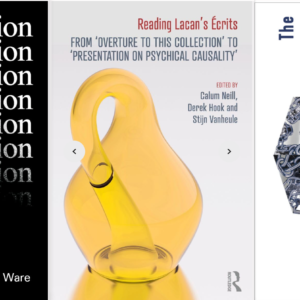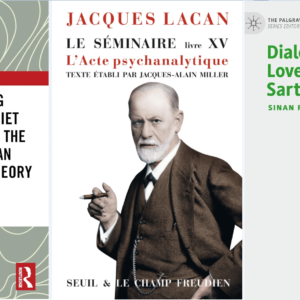News – November 2016
Among new publications in November was Lacan and Deleuze: A Disjunctive Synthesis, edited by Boštjan Nedoh and Andreja Zevnik. The book aims to present “a reconfiguration of the reception of Deluze and Lacan in Continental philosophy” and, as the subtitle suggests, it challenges the distance between the two theorists’ contributions. Over the course of the book’s 12 essays topics such as the baroque, perversion, death drive, topology and linguistics are addressed. Order it from the publishers, Edinburgh University Press, or from Amazon.
The second edition of the new journal The Lacanian Review, the Anglophone periodical of the NLS, was published last month. Titled ‘Sex All Over The Place’, it contains papers on the theme of sexuality, sexuation, and jouissance from European Lacanian analysts, as well as sections with papers on analytic formation, and clinical orientation from the School’s recent Congresses. The edtorial by Véronique Voruz can be read here (link downloads PDF). The full table of contents and a link to order are available on the ECF’s shop here.
The latest edition of the journal American Imago (Vol 73, Issue 3, Fall 2016), published in November, features a fascinating piece of historical research on Lacan by Juan Pablo Lucchelli. ‘The Early Lacan: Five Unpublished Letters from Jacques Lacan to Alexandre Kojève’ starts from 1935 and documents the correspondence between the young Lacan and the professor who taught him how to read Hegel. Those with an academic login can access the paper via Project Muse through the link above.
The November 2016 edition of the Ben Jonson Journal (Vol 23, Issue 2), published by Edinburgh University Press, features an article by Thomas L. Martin and Duke Pesta titled ‘“All for Love, and Nothing for Reward”: Psyche from Spenser to Lacan, and the Loss of Critical Values’, looking at the approaches to subjectivity and how they contrast in the work of Lacan versus the Tudor poet and author of The Faerie Queene, Edumund Spenser. The full text is available in PDF here.
Following up on last month’s events, audio from Stuart Schneiderman’s talk at Analytica in New York in November, ‘The Late Lacan – What is it like to work in analysis with Lacan?’, is now available on Analytica’s site (excerpt for guests; full audio for members). Schneiderman was only the second American to move to Paris and follow Lacan’s Seminar whilst also in analysis with him. Having since moved away from psychoanalysis his remarks focus on the fallout among Lacan’s students around the time of the dissolution of Lacan’s school, immediately prior to his death. Though very personal, the talk may nonetheless be of historical interest as the account of someone at the scene of these dramas in the Paris of the 1970s. Analytica’s list of upcoming events into 2017 is also available on the site, including on 7th December a talk on Lacan’s use of topology at the end of his teaching.
Among other upcoming events, throughout November the organisers of the 4th European Congress of Psychoanalysis (PIPOL 8) – on the theme ‘A Non-Standard Clinical Practice’ – published four newsletters with content preparatory for the theme. These include an article on the European political situation post-Brexit by Domenico Cosenza; one on parenthoods by Hélène Bonnaud; on contemporary erotica by Fabrice Bouriez; and on ‘body practices’ by Vander Vennet Luc. The Congress itself takes place 1st-2nd July 2017 in Brussels and registration is now open via the event’s site. There is also a call for papers to be presented at the Congress, submissions to be made by a deadline of 20th February 2017.
The Australian Centre for Psychoanalysis has published its 2017 calendar of events, including details of the ACP’s XVIIIth Symposium to be held on 27th May next year, which will be on the theme ‘Psychoanalysis, the Real, and Reality’. A number of visiting analysts will also come to the Centre, including Colette Soler from Paris and Prof Antonio Quinet from Brazil.
Also in Australia, the newly founded Lacan Reading Group, taking place at the National Institute of Dramatic Art in New South Wales, was inaugurated last month to study Lacan’s principle theories and their application to a broader understanding of texts, art, drama, literature, philosophy, and aesthetics. In its regular two-hour forums, the group aims to create a space where the learning, discussion and transmission of Lacan’s works become part of ongoing global scholarly debates. Poststructuralist responses to Lacanian theory, especially by Kristeva, Irigaray, Cixious, Derrida, Foucault, Delueze, Guattari, and Butler are part of the group’s research interest areas. The group is open to the postgraduates across humanities, writers, artists, and academics interested in Lacan and his theories. Lacan Reading is run by Dr Ehsan Azari, who teaches a postgraduate course for students of Master of Fine Arts (Writing for Performance) at NIDA. Contact Ehsan.Azari@nida.edu.au if you wish to participate in the meetings. The seminars will be held at Tutorial Room 3 at the National Institute of Dramatic Art (NIDA), 215 Anzac Parade Kensington, NSW, Australia.
Patrick Valas’ site has some excellent new resources updated last month. Chief among them are audio recordings of Lacan’s Seminar between 1977 and 1980. These cover the final period of Lacan’s work, during which questions of topology and the transmission of analytic knowledge through his School were foremost in his mind. Browse the rest of Valas’ site for other fascinating artefacts and resources, including the postcard sent by Freud to Lacan in 1933 thanking the latter for a copy of his doctoral dissertation. It reads simply, ‘Thanks for sending your thesis’.
Last but not least, Richard G. Klein’s excellent Freud2Lacan.com was also updated last month with texts and resources for psychoanalytic scholarship. Among new additions are full texts in PDF of Freud’s series of metapsychological papers and a list of all translations into English of the text’s from Lacan’s Autre Écrits.
Got news? Get in touch.




Leave a Reply